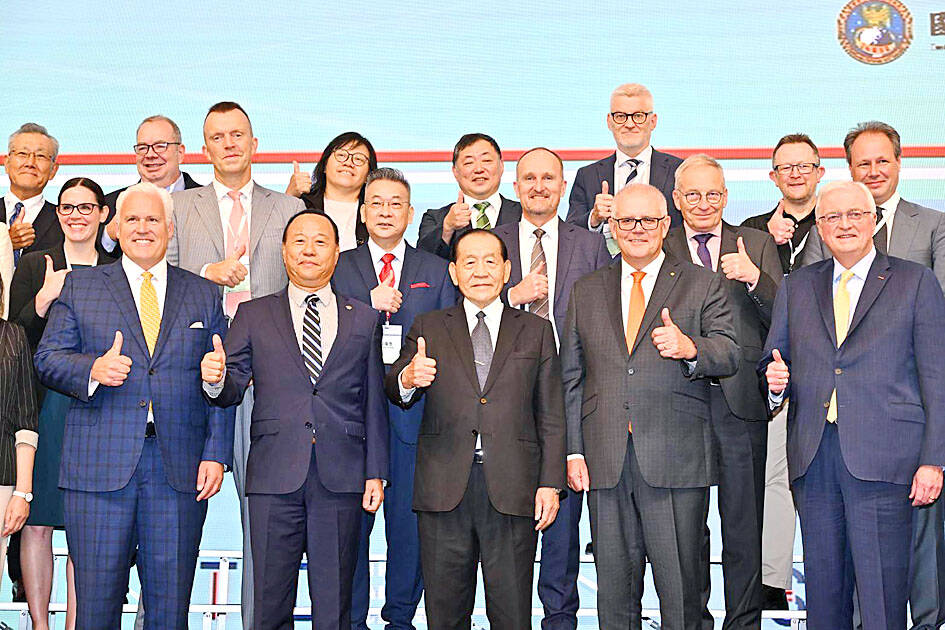The world cannot afford to ignore Taiwan’s security and allowing the nation to succumb to China’s authoritarian rule would have global repercussions, former Australian prime minister Scott Morrison said yesterday.
“Taiwan matters to the world,” Morrison said in his keynote address at the Taipei Security Dialogue, adding that maintaining the “status quo” across the Taiwan Strait is essential to the “security, prosperity and sovereignty” of countries such as Australia, the US and Japan.
“If Taiwan were to be forcibly placed under the authoritarian rule of the CCP [Chinese Communist Party], there would not be a corner of the globe that would be unaffected,” said Morrison, who was prime minister from 2018 to 2022.

Front row, from left, American Conservative Union chairman Matthew Schlapp, Deputy Minister of Defense Alex Po, Institute for National Defense and Security Research chairman Huo Shou-ye and former Australian prime minister Scott Morrison pose for a photograph with other participants of the Taipei Security Dialogue in Taipei yesterday.
Photo: Tien Yu-hua, Taipei Times
Once the first island chain “breaks,” the US would have to push back to the second island chain, “diminishing their ability to provide an effective security counterbalance in the Indo-Pacific,” he said.
The Chinese People’s Liberation Army would then have the ability to project air, naval, missile and surveillance capabilities through the Bashi Channel and the Miyako Strait into the Philippine Sea, and maritime and air traffic between Japan, South Korea and Southeast Asia would have to pass near and through effectively China-controlled borders and airspace, he said.
Morrison called on democracies around the world to strengthen collective deterrence through new initiatives and partnerships such as AUKUS — a trilateral security partnership between Australia, the UK and the US — which he said can help counter the CCP’s ambitions “to establish regional hegemony over the Indo-Pacific.”
Taiwan has made progress in enhancing its defense capabilities through collaboration with the US, acquiring Javelin and Stinger missiles, Harpoon coastal defense systems, mine-laying systems and loitering munitions, along with the development of indigenous missiles, but it still has a long way to go, he said.
American Conservative Union chairman Matthew Schlapp told the forum that the US is no longer singularly focused on Russia, creating a critical transition period for the safety of the free world.
“In America, we have been taught that America’s No. 1 strategic foe on the globe is [Russian President] Vladimir Putin... It’s hard to see him as more of an economic or military threat than the regime in Beijing,” Schlapp said.
US President Donald Trump’s administration understands that the CCP, and the regime in Beijing are an existential threat to freedom and free trade, he said.
“If America is weak, and America elects weak leaders, this is a terrible thing for the people of Taiwan, in terms of our economic relationship, but [also] the security issues,” he said.
American Defense International chairman and former US Army deputy assistant secretary Van Hipp Jr said that Taiwan plays a critical role in regional peace, and praised the government’s decision to increase defense spending as “taking a step in the right direction.”
Cyberwarfare has evolved into the “fifth-dimensional battlefield,” and the evolution of that technology will always surpass the speed at which governments make policy decisions, Hipp said.
If Taiwan invests in a “smart network” integrating artificial intelligence (AI) and uncrewed platforms, it would increase its military autonomy and countermeasure capabilities, he said, adding that AI could also help identify targets and manage logistics.
Former British Royal Navy commodore Peter Olive said that attempting to land troops in Taiwan would be 20 times more difficult than the landing at Normandy in World War II.
China might have to heavily rely on its coast guard or civilian vessels to enforce a blockade of Taiwan, he said.
Royal United Services Institute senior research fellow Philip Shetler-Jones said the goal of deterrence is to render enemy invasions insignificant, citing how Ukraine’s resilience is already sending a signal of deterrence.
China would attempt to use cyberwarfare, economic means and limited blockades to weaken social resilience and pressure Taiwan without giving the US cause to intervene, he said.
Counterblockades in regions far removed from Taiwan, such as the Indian Ocean, could cut off Chinese shipping at its source, Shetler-Jones said.
Oliver said that Taiwan should collaborate with global shipping companies, insurance companies and port authorities to establish a system of alternative routes, enabling Taiwan to import necessary goods and supplies.
Institute for National Defense and Security Research chairman Huo Shou-ye (霍守業) told the forum that regional players and like-minded countries should integrate their deterrence capabilities to maintain peace and democracy in the Indo-Pacific region.
Peace in the Taiwan Strait is no longer a regional security issue, but a global concern, he said.
Taiwan does not seek to provoke or antagonize, but is demonstrating that it has the wherewithal to provide an effective deterrence, Huo said.
Source: Taipei Times - 2025/10/09




















